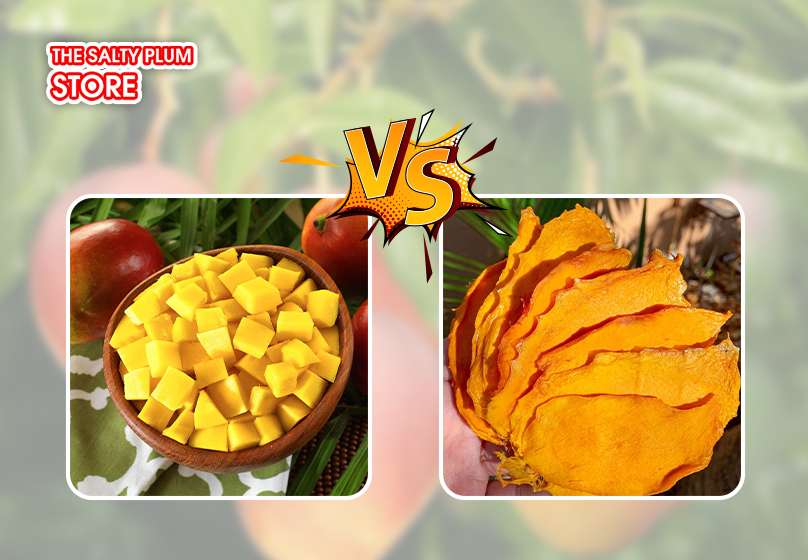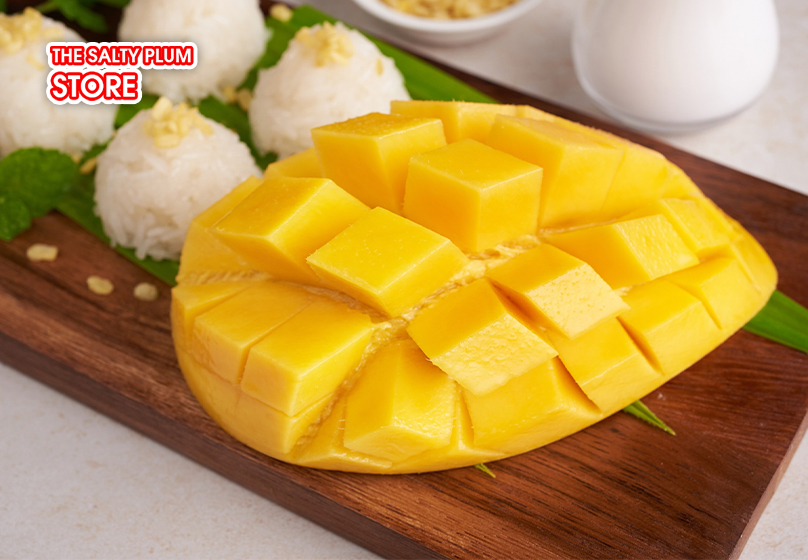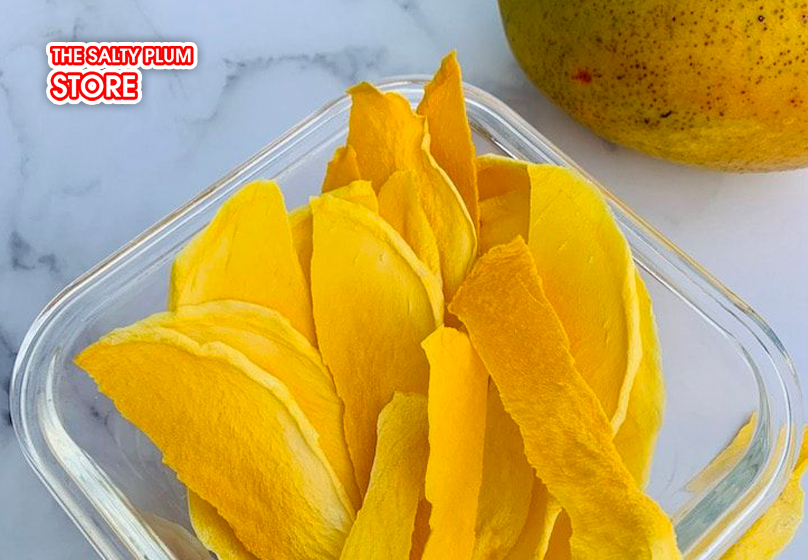Mango is a tropical fruit loved worldwide for its sweet, refreshing taste and impressive nutrient profile. Beyond being enjoyed fresh, it’s also commonly consumed in dried form, offering a chewy, concentrated burst of flavor. Both fresh mango and dried mango are delicious and nutritious, but which one is better for your health?
In this article, we’ll explore “Dried Mango vs Fresh Mango”, a detailed comparison of their nutritional values, health benefits, and potential drawbacks. By the end, you’ll have a clearer understanding of which option best suits your dietary needs and lifestyle.

I. Nutritional Comparison of Dried Mango vs Fresh Mango
1. Calories and Sugar
- Fresh mango: With its high water content, fresh mango is naturally lower in calories. The natural sugars are more diluted, making it a better option for those watching their weight.
- Dried mango: Once the water is removed, nutrients and sugars, become concentrated. As a result, dried mango can contain 3–4 times more calories and fructose per gram compared to fresh mango.
2. Fiber
- Dried mango: Richer in dietary fiber per 100 grams, dried mango can support digestion and help you feel full for longer.
- Fresh mango: Still a good source of fiber, though in smaller amounts due to its water content.
3. Vitamins and Minerals
- Fresh mango: A powerhouse of vitamin C, along with vitamin A, B6, folate, and potassium.
- Dried mango: Loses a significant portion of vitamin C during the drying process, but remains a good source of vitamin A, potassium, magnesium, and iron.
4. Antioxidants
- Fresh mango: High in vitamin C, lutein, and zeaxanthin, which are powerful antioxidants that support immune function and eye health.
- Dried mango: Still provides beta-carotene and polyphenols, though levels may be reduced due to heat exposure during drying.
Read more: Dried Mango Nutrition: Health Benefits, Smart Tips & Delicious Ways to Enjoy It

II. Health Benefits of Fresh Mango
Fresh mango is more than just a sweet tropical fruit—it’s a nutrient powerhouse that offers a variety of health benefits:
1. Boosts immunity
One of the standout qualities of fresh mango is its high vitamin C content. A single cup of sliced mango can provide a significant portion of your daily vitamin C needs. This vitamin strengthens the immune system, helps the body fight off infections, and supports the healing process. Regularly including fresh mango in your diet can be an easy way to keep your defenses strong.
2. Supports digestion
Mango contains amylase, a natural enzyme that breaks down carbohydrates into simple sugars, making it easier for your body to digest food. Combined with its natural fiber, fresh mango can help regulate bowel movements, prevent constipation, and promote overall gut health. This makes it a gentle yet effective food for digestive wellness.
3. Protects eyes and skin
Fresh mango is rich in vitamin A and antioxidants like lutein and zeaxanthin. These nutrients play a crucial role in maintaining good eyesight, protecting against age-related macular degeneration, and reducing eye strain from screens. At the same time, vitamin A supports healthy, glowing skin and helps prevent dryness and early signs of aging.
4. Keeps you hydrated
Composed of nearly 80% water, fresh mango is an excellent choice during hot weather or after physical activity. It not only quenches thirst but also helps replenish fluids and electrolytes, contributing to overall hydration and energy levels.
5. Low in calories
Compared to dried mango, fresh mango is naturally lower in calories and sugar per serving, making it a more weight-friendly option. This makes it especially suitable for those who want to enjoy a sweet snack without derailing a calorie-controlled or weight-loss diet.

III. Health Benefits of Dried Mango
Dried mango isn’t just a tasty snack—it’s also packed with concentrated nutrients that can benefit your body in several ways:
- Quick source of energy: Because dried mango is calorie-dense, it provides a rapid boost of energy, making it an excellent option for athletes, hikers, or anyone with a busy lifestyle. A small portion can supply the fuel your body needs to stay active throughout the day.
- Rich in fiber: Dried mango contains more fiber per gram than fresh mango, thanks to the concentration process during drying. This fiber supports digestion, promotes regular bowel movements, and helps you feel full for longer periods, which may aid in controlling appetite.
- Provides essential minerals: Unlike many processed snacks, dried mango delivers important minerals such as potassium, magnesium, and iron. Potassium and magnesium help regulate heart health and muscle function, while iron supports healthy blood circulation and reduces the risk of anemia.
- Packed with vitamin A and antioxidants: Dried mango remains a strong source of vitamin A, even after the drying process. Vitamin A supports eye health, skin repair, and immune function. Additionally, antioxidants like beta-carotene help fight oxidative stress, protecting your cells from free radical damage.
- Convenient and shelf-stable: One of the biggest advantages of dried mango is its portability. It doesn’t require refrigeration, has a long shelf life, and is easy to carry. This makes it a practical, healthier alternative to processed sweets or chips, especially when traveling or looking for a quick snack.

IV. Potential Drawbacks of Each
1. Fresh Mango
- Spoils quickly and has a short shelf life, making storage and transportation more difficult.
- May trigger allergic reactions in some individuals due to mango latex, a compound found in the skin and sap.
2. Dried Mango
- High in sugar and calories, which can contribute to weight gain and cause blood sugar spikes if consumed in excess.
- Many commercial varieties contain added sugars and sulfur dioxide (a preservative for color), which may cause adverse reactions in sensitive individuals.
- Loses a significant amount of vitamin C during the drying process.

V. Conclusion
When it comes to Dried Mango vs Fresh Mango, there isn’t a single “better” option, each has its own unique strengths. Fresh mango is hydrating, low in calories, and an excellent source of vitamin C, making it ideal for those seeking a refreshing, nutrient-dense snack. Dried mango, on the other hand, offers concentrated fiber, vitamin A, and essential minerals, while being highly convenient and shelf-stable.
The key is balance. Enjoy fresh mango when you want a light, immune-boosting fruit, and reach for dried mango when you need a quick energy source on the go. Just remember to choose unsweetened, preservative-free varieties of dried mango and consume them in moderation. By including both forms in your diet, you can take advantage of their complementary health benefits and keep your snacking both delicious and nutritious.
